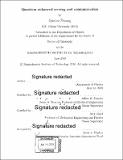Quantum enhanced sensing and communication
Author(s)
Zhuang, Quntao
DownloadFull printable version (26.66Mb)
Other Contributors
Massachusetts Institute of Technology. Department of Physics.
Advisor
Jeffrey H. Shapiro and Seth Lloyd.
Terms of use
Metadata
Show full item recordAbstract
Quantum phenomena such as entanglement and superposition enable performance beyond what classical physics can provide in tasks of computing, communication and sensing. Quantum sensing aims to enhance the measurement precision in parameter estimation or error probability in hypothesis testing. The first part of this thesis focuses on protocols for entanglement-enhanced sensing. However, various quantum sensing schemes' quantum advantage disappears in presence of decoherence from noise and loss. The quantum illumination protocol, on the other hand, has advantage over classical illumination even in presence of decoherence. This thesis provides the optimum receiver design for quantum illumination, and extends quantum illumination target detection to the realistic scenario with target fading and the Neyman-Pearson decision criterion. Quantum algorithms can solve difficult problems more efficiently than classical algorithms, which makes various classical encryption schemes vulnerable. To remedy this security issue, quantum key distribution enables sharing of secret keys with unconditional protocol security. However, the secret-key-rate of the state-of-art single-mode based quantum key distribution protocols are limited by a fundamental rate-loss trade-off. To enhance the secret-key-rate, this thesis proposes a multi-mode based quantum key distribution protocol. To prove its security, the noisy entanglement assisted classical capacity is developed to enable a security framework for two-way quantum key distribution protocols such as the one proposed here. An essential notion in the entanglement assisted capacity is additivity. This thesis constructs a channel with non-additive classical capacity assisted by limited entanglement assistance, even when the classical capacity of the channel is additive.
Description
Thesis: Ph. D., Massachusetts Institute of Technology, Department of Physics, 2018. Cataloged from PDF version of thesis. Includes bibliographical references.
Date issued
2018Department
Massachusetts Institute of Technology. Department of PhysicsPublisher
Massachusetts Institute of Technology
Keywords
Physics.